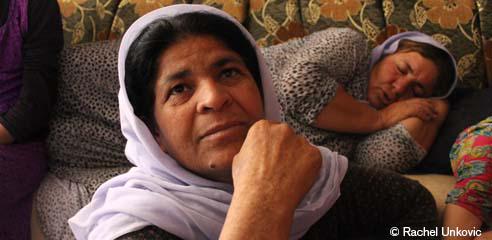Both Kurdish and Arab women in Iraq prefer – or are pressured by their male family members – to stay close to home, limiting their opportunities to safely generate income, even while the country's conflict has significantly, negatively impacted most of the livelihoods in this region.
The street-facing walls of the mukhtar’s house have recently been plastered and painted yellow, but the back side is still pocked by bullet holes marking ISIS’s siege a few months ago. Families started returning to northern Diyala in the Kurdish Region of Iraq (KRI) in the last few weeks, as soon as the Peshmerga certified the village clear of IEDs (some were booby-trapped pencils to entice children). And the area now hosts many Arab families that have fled here from other parts of Iraq; they sold their sheep and jewelry along the journey, have depleted their savings, and are being hosted in chicken barns.
I was in Kurdistan working with Oxfam, assessing livelihood needs, associated risks and mitigation strategies: How has access to local markets been impacted by the crisis and what support is needed for livelihoods to recover? What are the unique risks that women and adolescent girls face while earning a living for their families? How are they protecting themselves and how can these strategies be strengthened? What activities are negotiable, viable and safe for women?
Men are frustrated as they struggle to feed their families and keep their children in school. With the road to Baghdad blocked, the demand for laborers in the nearby block-factories has slowed. Traders struggle to replace stolen stock and farmers and shepherds are having a hard time accessing land for reaping and grazing.
Women’s and girls’ opportunities in KRI are even more limited. Both Kurdish and Arab women prefer – or are pressured by their male family members – to stay close to home. They fear kidnapping and trafficking by ISIS, and there is a deeply ingrained fear of strangers among both displaced and host communities.
Goran, a Kurdish Iraqi woman, began trading when she was widowed. Today, she continues to buy and sell soap, shampoo, cigarettes, women’s clothing and kitchen utensils. Recently, she has started loaning money to other women for their micro-enterprises. Zainab, an Arab Iraqi woman, has transplanted her salon business here. She now cuts hair and paints nails for the women of the host community. Another woman makes and sells cheese, yogurt and milk to her neighbors.
We know that engaging women in economic activities can empower them and improve their resilience. At the same time, when displaced women are given the opportunity to earn an income – often for the first time – poor program design can fuel a backlash by male community members, increasing intimate partner violence and other forms of GBV, such as sexual exploitation and abuse.
Goran braces herself against verbal harassment for breaching gender norms, and departs and returns early when she travels to a more distant market where she has no social networks to insulate her from theft or assault.
Based on the recommendations from our assessment, Oxfam staff and their local partners will engage men to not only permit or tolerate but to champion women’s own activities, provide grants and training for new businesses, link traders with alternative markets and create women’s foods processing and dairy cooperatives. Importantly, Oxfam will monitor these activities for unintended negative consequences and respond to any new protection risks to foster safe, resilient livelihoods by strengthening the capacity of communities to protect themselves.
There are many challenges. But with support from humanitarian agencies and the men in their communities – and taking into account the cultural context, market needs and risks faced – the displaced women in KRI will be able to safely expand their income-generating options, reinvest in their businesses and provide for themselves and their families.


